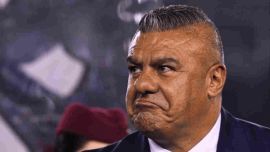President Alberto Fernández confirmed on Sunday that he will send Congress a proposal to legalise voluntary abortion in Argentina imminently, reigniting a debate that divides the nation just two years a similar move was rejected by the Senate.
In a speech opening the 138th sessions of Congress (which went much along the same lines as trailed by government officials), on a sweltering day in the capital, the Frente de Todos leader addressed topics such as judicial reform, an overhaul of the country’s intelligence services, Argentina’s debt burden and the 1994 bombing of the AMIA Jewish community centre.
Abortion reform
The most eye-catching moment, however, was undoubtedly the Peronist leader’s commitment that he would seek to legalise abortion in Argentina in the coming months.
"Within the next 10 days, I will present a bill for voluntary termination of pregnancy that legalises abortion at the start of pregnancy and allows women to access the health system when they make the decision to abort,” he said, prompting wild applause from those in favour.
Dozens of lawmakers rose to their feet to applaud the announcement, which came during a speech opening the 2020 congressional sessions.
Under law, abortions are currently permitted in cases of rape or where a mother's life is at risk, though many women in such conditions find it difficult to access the procedure legally.
A measure to legalise elective abortions in the first 14 weeks of pregnancy passed the lower house Chamber of Deputies in 2018, but failed in the Senate.
“The current legislation on abortion is not effective,” said the Frente de Todos leader.
“It has condemned many women of scarce resources to turn to clandestine abortion practices, putting at risk their health and many times their lives,” he added.
The Health Ministry estimated in 2016 that as many as half a million clandestine abortions a year take place in Argentina each year.
"Abortion happens, it is a fact," which women turn to "in the absolute secrecy," he added, saying that his bill would be accompanied by a new "comprehensive sexual education programme" for Argentina and a programme that would help support a mother and her child in the first 1,000 days of the child’s life.
Thousands of supporters outside Congress also cheered and applauded. The proposal will be met by stern resistance from the Catholic Church and evangelical community, who will stage a demonstration against the move next weekend.
Chances of the bill passing are arguably more favourable, given the majority Peronism holds with its allies in the Senate. The Frente de Todos coalition is also the largest force in the Chamber of Deputies.
"Every society needs to respect the individual decision of its members to decide freely about their bodies," he declared.
Debt
Debt also ranked high on the president’s agenda. Argentina has more than US$300 billion in public debt outstanding and the government is seeking to renegotiate repayment terms for at least US$100 billion, with a whopping US$44 billion owed to the IMF alone.
Facing the crisis head on, Fernández capitalised on recent support from the Fund’s officials and paraphrased their recent declaration that Argentina’s current debt burden is “unsustainable.”
“The most important thing is that the agreement we reach with the creditors is sustainable,” he told lawmakers pointedly.
"We need an agreement that allows Argentina to stand up and not fall down again. That is non-negotiable," he said, without supplying details of the government’s debt restructuring proposal to creditors.
The Peronist leader has set a self-imposed March 31 deadline for talks to finish and neither Fernández nor his Economy Minister Martín Guzmán have been forthcoming with details.
An IMF mission team is expected in Buenos Aires this week, as talks continue. Two weeks ago, when the team ended its first visit to Argentina, the Fund’s officials suggested that private bondholders would need to make “a meaningful contribution” – comments most interpreted as support for a haircut.
The president said that his government was “working constructively” with the IMF.
"We prefer an orderly resolution to the debt crisis and we are moving towards it,” he declared.
Fernández warned, however, that "there are many interests at stake, [and] there are people with interests other than the country’s, who do not hesitate to play hard" – a less than subtle reference to holdouts that may seek full repayment of Argentina’s public debt.
Fernández also announced that he would send a bill to Congress to “promote and stimulate” national and international investment in hydrocarbons exploitation and mining development, declaring that “metal mining and lithium" are "great opportunities for export."
He also dropped a heavy hint that oil exploration may take place offshore, saying one bill would address the demarcation of the outer limit of the continental shelf.
Judicial reform
Among the 10 or so bills announced by the president was judicial reform, a topic that has garnered many column inches in recent weeks.
Fernández provided some details about his bid to “reorder federal justice,” saying he wanted to end the “construction of false cases [and] arbitrary detentions.”
He said the court system would be re-ordered with the "creation of a new federal criminal jurisdiction." No longer would “crimes against public administration” by public officials be in the hands of a few judges,” he added, saying he wanted as many as 50 to oversee such cases.
The ex-Cabinet chief argued it was necessary to “promote a reorganisation of [the] federal justice [system] that avoids the activation of [case-]files along political lines.”
"I have come to make a commitment that I will never break: to put an end to the appointment of friendly judges and the political use of justice," he said, as his Vice-President Cristina Fernández de Kirchner, sat alongside him.
“We must optimise the operation of the Supreme Court," he added, as two chief justices, Carlos Rosenkrantz and Elena Highton de Nolasco, watched on.
Elsewhere
Also among those in attendance at the event were presenter and media mogul Marcelo Tinelli, veteran Camioneros union leader Hugo Moyano and Nobel Peace Prize winner and human rights activist Adolfo Pérez Esquivel.
The president skipped the inauguration of Uruguayan leader Luis Lacalle Pou in Montevideo to open the congressional sessions, but for the most part, foreign policy was absent from the speech – a fact that drew criticism from the opposition – except for a vow to finally uncover the truth behind the horrific 1994 bombing of the AMIA Jewish community centre in the capital, an attack that left 85 dead and around 300 wounded.
Fernández, speaking 81 days after his inauguration, vowed to declassify all secret testimonies provided by intelligence agents related to the investigation into the attack.
He also vowed to award post-mortem honours to the late crew of the ARA San Juan submarine, which tragically imploded in 2017.
Despite much talk of unity, the president’s speech also featured a few thinly veiled attacks on the government led by Fernández's predecessor, Mauricio Macri – particularly on the debt issue.
"The public debt we inherit is, without a doubt, the biggest obstacle we face," he said at one point. "Never again to the revolving door of dollars that enters by indebtedness and escapes leaving scorched earth in its way.”
The plight of the nation’s worse-off was a regular theme, with remarks to poverty littered throughout the speech.
"There is no worse alternative than fiscal austerity during recessions,” he said. “It leads to more poverty and inequality.”
Argentina has been in recession for almost two years, with an inflation rate of 53.8 percent recorded in 2019 and poverty rising close to 40 percent.
"We are not going to pay off the debt at the cost of hunger and the destruction of dreams of Argentines. We are going to take care of our country," declared the president.
To that end, he announced a bill to create a “Economic and Social Council” to help Argentines.
Criticism
Unsurprisingly, the president's address was quickly criticised by opposition leaders. PRO party leader and ex-security minister Patricia Bullrich was among those to express their dissatisfaction, taking issue with a passage in which the president criticised the Macri administration’s security policies.
“Alberto Fernández says that the lie is the greatest perversion, but in his speech he lied about everything we did in security [ministry]. Do not deny reality, Alberto, the achievements from our management model are in full sight and the Argentines know it," she posted.
The official Twitter account for the PRO party also adopted an offensive approach during the speech, critiquing points from the president’s speech. For example, it argued that ex-president Macri had already ordered the declassification of AMIA intelligence documents in 2017 and disagreed with a section that slammed the Macri government's investment in the rail system.
– TIMES/AP/AFP/NA


























Comments